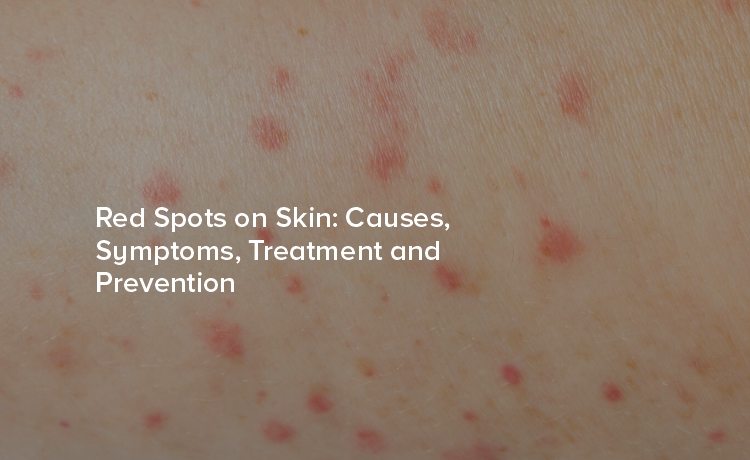
Have you ever noticed mysterious red spots appearing on your skin? These little blemishes can be puzzling and often leave us wondering about their cause. Many people experience red spots at some point in their lives, and while they can be harmless, they might also be signaling something more serious.
Red spots on the skin can vary from tiny dots to large blotches. They can appear anywhere on the body and might be accompanied by other symptoms like itching or swelling. These spots can result from various factors ranging from minor irritation to more serious health conditions. Knowing the possible causes and associated symptoms can help you make informed decisions about when to seek medical advice or try home remedies.
The reasons behind red spots on the skin are numerous. In many cases, they're caused by allergies or irritants. For instance, contact with certain plants, soaps, or cosmetics can lead to red spots. Other common causes include infections like chickenpox or measles, which are more prevalent in children. Additionally, conditions like heat rash can appear after prolonged exposure to hot and humid environments. Understanding these common causes can help alleviate concerns and guide you toward the right treatment.
Allergic reactions are a primary cause of red spots on the skin. When the body encounters an allergen, it releases histamines that can lead to redness and inflammation. Common allergens include pollen, pet dander, certain foods, and insect bites. A patch test can help identify specific allergens responsible for your skin reaction. Managing allergies often involves avoiding known triggers and using antihistamines or topical creams to reduce symptoms.
Infections and viruses are another significant cause of red spots. Viral infections like rubella or roseola are known for causing rash-like appearances on the skin. Bacterial infections can also lead to similar symptoms. It's essential to monitor other signs such as fever, fatigue, or body aches, which can accompany these conditions. In such cases, consulting a healthcare professional is crucial for proper diagnosis and treatment.
Recognizing accompanying symptoms can provide valuable clues to the underlying cause of red spots. Apart from redness, symptoms like itching, swelling, or pain may be present. Some individuals might experience systemic symptoms such as fever or joint pain, indicating a more extensive issue. Keeping track of these symptoms and their progression can aid physicians in forming an accurate diagnosis.
Treatment for red spots on the skin varies based on the underlying cause. For minor irritations and allergies, over-the-counter creams and antihistamines can offer relief. Moisturizing the skin and avoiding known triggers also help prevent recurrences. In more severe cases, prescription medications or therapies might be necessary. Consulting a dermatologist ensures you receive a treatment plan tailored to your specific needs.
For those who prefer natural approaches, several home remedies can alleviate red spots. Applying cool compresses or using aloe vera gel can soothe irritated skin. Oatmeal baths are known for their anti-inflammatory properties, providing relief for itchiness. Additionally, maintaining a balanced diet rich in antioxidants supports skin health and resilience against irritants.
Preventing red spots involves adopting healthy skincare habits. Regularly moisturizing and using sunscreen protect the skin from environmental damage. Wearing breathable clothing and keeping the skin clean minimizes the risk of developing rashes. Additionally, identifying and avoiding allergens play a vital role in preventing allergic reactions.
While many red spots are harmless, some might indicate serious conditions requiring medical intervention. Persistent spots that change in appearance, bleed, or are accompanied by other concerning symptoms warrant a doctor's visit. Early detection and treatment can prevent complications and promote quicker recovery.
Certain skin conditions like psoriasis or lupus can manifest as red spots. These autoimmune disorders often require a comprehensive treatment approach and continuous monitoring. Recognizing early signs and seeking timely medical advice ensures proper management and improved quality of life.
Long-term skin health involves more than addressing immediate concerns. A consistent skincare routine and a healthy lifestyle contribute to overall skin resilience. Staying informed about skincare practices and products empowers you to make choices that support lasting skin health.
Developing a skincare routine suited to your skin type is crucial for preventing red spots. Cleansing, exfoliating, and moisturizing form the foundation of any regimen. Selecting products with gentle ingredients and avoiding harsh chemicals prevents unnecessary irritation. Regularly consulting with skincare professionals keeps you informed about the best practices for your skin's needs.
Red spots on the skin might be common, but understanding their causes and treatments can help you manage them effectively. Whether they're a result of an allergy, infection, or a more serious condition, being informed empowers you to take control of your skin's health. Remember, your skin is a reflection of your overall well-being.